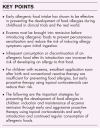Regular consumption following early introduction of allergenic foods and aggressive treatment of eczema are necessary for preventing the development of food allergy in children
- PMID: 38538069
- PMCID: PMC11062606
- DOI: 10.1097/ACI.0000000000000983
Regular consumption following early introduction of allergenic foods and aggressive treatment of eczema are necessary for preventing the development of food allergy in children
Abstract
Purpose of review: Over the past two decades, food allergy prevention strategies have shifted from 'delayed introduction' to 'no delayed introduction' to 'early introduction' of allergenic foods. This article reviews important research in this field published in the early 2020s to support future strategies for food allergy prevention.
Recent findings: Recent randomized controlled trials (RCTs), systematic reviews, meta-analyses, and real-world studies have reported that early allergenic food introduction, especially peanut and egg, are effective for preventing food allergies. However, there are also reports that food-induced anaphylaxis admission rates in infants are increasing.
Summary: Early allergenic food introduction by itself is not sufficient to prevent the development of food allergies. Recent RCTs (SPADE study and COMEET study) have demonstrated that continued regular cow's milk consumption after early introduction is important for preventing the onset of cow's milk allergy. Furthermore, an RCT (PACI study) reported that early and aggressive anti-inflammatory topical therapy for eczema can contribute to the prevention of egg allergy by suppressing percutaneous sensitization. Food allergies may be prevented through a combination of early food introduction, regular consumption, and active eczema treatment. Further research is needed to develop well tolerated, effective, and practical strategies to prevent food allergies.
Copyright © 2024 The Author(s). Published by Wolters Kluwer Health, Inc.
Conflict of interest statement
References
-
- Sampath V, Abrams EM, Adlou B, et al. . Food allergy across the globe. J Allergy Clin Immunol 2021; 148:1347–1364. - PubMed
-
- Spolidoro GCI, Ali MM, Amera YT, et al. . Prevalence estimates of eight big food allergies in Europe: updated systematic review and meta-analysis. Allergy 2023; 78:2361–2417. - PubMed
-
This systematic review and meta-analysis of studies on food allergy prevalence in Europe reports that the prevalence of allergies to common foods did not increase over the past decade.
-
- Perkin MR, Logan K, Tseng A, et al. . EAT Study Team. Randomized trial of introduction of allergenic foods in breast-fed infants. N Engl J Med 2016; 374:1733–1743. - PubMed
Publication types
MeSH terms
Substances
LinkOut - more resources
Full Text Sources
Medical
Research Materials
Miscellaneous


